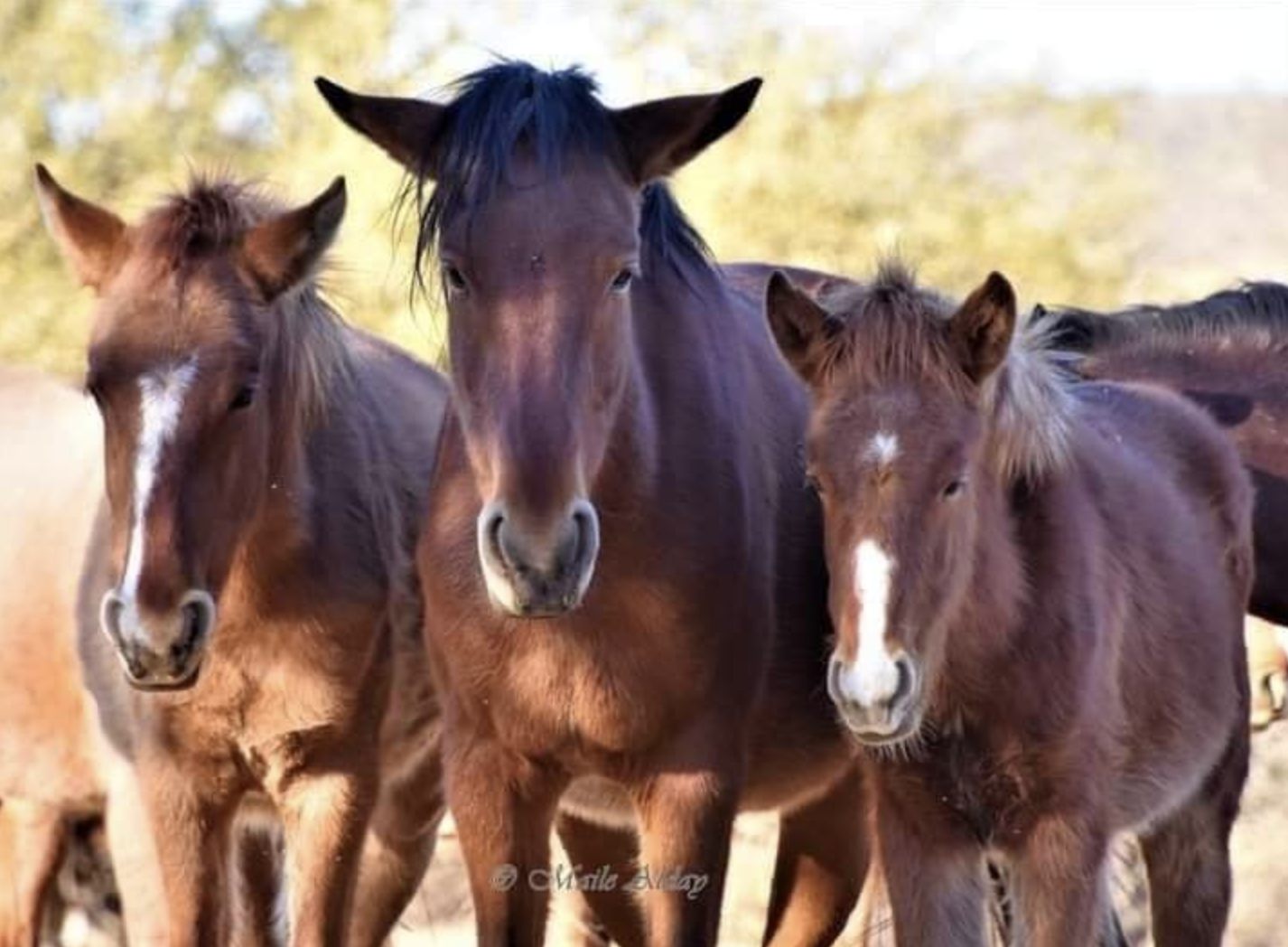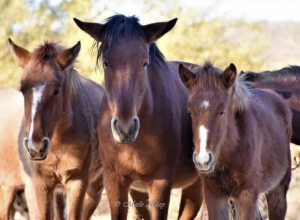
A Story of Humane Wild Horse Management
January 19th

A story of humane wild horse management, by Simone Netherlands, picture by Maile Alday.
This is Serena in the middle, with her offspring Sergeant on her right, and Soldier on her left, living happily ever after in the Tonto National Forest, against all odds.
We all know that nature can be cruel sometimes, and little Soldier is one of those foals who would not have made it, if we, SRWHMG let nature have its way.
If you have not heard the story previously, here is the short version:
While Soldier was being born, Serena had no protection from her lead stallion who was incapacitated with VSV. She became the subject of a battle between a dozen bachelor stallions, who were trying to conquer Serena. Soldier, not even two hours old, was in the midst being thrown and kicked around in the process. While Serena put up on the most amazing mare maneuvers to protect her newborn, she was losing the fight. (We published the dramatic footage by Drew Hastings right after it happened.)
We could not watch this go on, so together with our Ag liaison Makenzie, the decision was made to save the fragile foal, by making a protective human circle around him and his mom. Many people helped and we picked up sticks and yelled at the stallions, it was quite the spectacle, but it worked.
Serena seemed in tune with the fact that we were protecting her, and finally Soldier could get up and drink his vitally important first milk. In the middle of our circle, a heart touching moment for everyone involved. We then continued to stay with them the entire day and the next, until the bachelors finally gave up on conquering Serena.
Is that messing with nature? It certainly is.
But I’ve seen enough suffering at the hands of nature (as well as at the hands of government roundups).
However, the tiny foal’s battle for survival was not over. He had an injured hock, from being thrown around, but he bravely kept up with his protective mom and sweet brother. It was hard to monitor him hopping around on mostly 3 legs for what seemed to be forever, but we knew that he would eventually recover, and now, he has.
Had we not messed with nature, this would have been one less horse in the herd. Serena would have just produced a new foal the next year, and the next and the next, that’s how nature fixes that. Likewise, during a drought, a large percentage of the herd would just die off, because that is how nature balances the numbers the other way. It’s harsh, and not exactly what the public wants to see when they are on a relaxing in the national forest.
So while we have prevented some deaths and suffering, it’s only responsible to prevent births also. We have effectively found a way to balance the numbers, but in a more humane way than nature would do it, and a much more humane way than the government would do it.
Serena is a fabulous mother. Every year, her body conceives and is pregnant for 11 months, while she feeds a foal plus a yearling at the same time. That is 3 mouths to feed, which is very taxing on her body. She has 8 surviving offspring; good job Momma, you can now retire! Thanks to our successful PZP program. Serena is not pregnant and will not conceive again, as long as we give her her yearly booster.
Is that messing with nature? It certainly is.
Serena is now much healthier and has time to raise her two boys. Instead of a new foal, it is Soldier who gets to live happily ever after, a more than fair exchange with nature, we think.
The deeper meaning of this story is that without this form of safe birth control, Serena and her family might not have been here at all.. This herd had no legal right to live on the forest and were unprotected by the free roaming Wild Horse and Burro act.
Without question, it was thanks to our PZP humane management proposal, that this herd’s fate was turned around. Through the cooperation of government agencies and politicians who did the right thing, and with the premise that we could stop the herd from growing out of their boundaries, the roundup was canceled in December of 2015.
But even today, there are no solid guarantees of no removals. That is why we work so hard to stabilize the population in this manner, so that all of them can stay wild and free, in the place they have called home for centuries.
On both sides there are many people who still do not understand that there are better ways, and that they are available right now, not in the future.
Preventing suffering, while also preventing births, doesn’t make wild horses any less wild, it makes them humanely managed, and that is a beautiful thing.
Many of you helped to hope and pray for the best outcome for Soldier. Many of our volunteers are taking turns monitoring them. When you are hoofing it through the desert in 112 degree heat and you can barely go on, it is this exact picture that you keep in mind and hope to take or see one day.
There is real blood, sweat and tears involved in managing wild horses and trying to make change. All I have to do is look at these three faces to know we are doing right by them all, and I am so thankful that we can.
Therefore I thank our supporters for the undying support for our work, I thank our dedicated and compassionate volunteers for the blood sweat and tears, and all of us should thank the USFS and the AZDA for their partnership in this novel cooperation for the humane and responsible management of the Salt River wild horses.
May they live happily ever after.
![]() Picture by supporter Maile Alday who was part of the effort to protect Soldier.
Picture by supporter Maile Alday who was part of the effort to protect Soldier.
